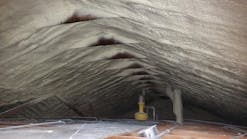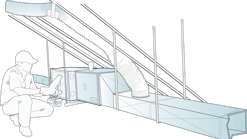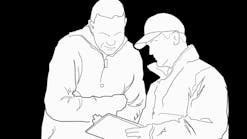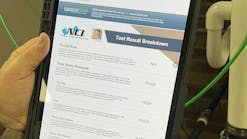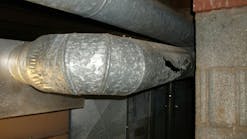Twenty years ago, I was balancing a newly renovated HVAC system. The homeowner had called in Sears to repair their refrigerator and I was fascinated by what I saw. The service tech whipped out a laptop computer, typed in the model number, and his computer told him how to fix the refrigerator. Let’s take a look at this technician, was he a wimp, or a stud?
As you think about this question, remember this event happened 10 years before the iPhone was introduced to the market and back then, Googol was the number 1, followed by 100 zeroes. The internet was just beginning to be used by the general public and bringing a laptop into a sales call was a major way to impress your customers.
I’ll admit at the time, I was super impressed with the technology, but was bothered by the idea that this guy needed a machine to tell him how to do his job. However, as I’ve used this experience to drive many ideas and conversations in my life today, my opinion of this technician and his technology has shifted.
Technology is leaping forward at an ever-increasing pace. The question is, Are those of us in the HVAC industry keeping up with the benefits of technology? Or are we holding on to the past, causing us to fall behind?
Your attitude towards technology can be summed up by whether you think this technician was a wimp or a stud.
Other Professions Have Adapted
Just this week, I had two experiences where well-paid professionals shamelessly went to the internet to find answers they needed to solve the problem I was paying them to solve.
One professional was a physician. I asked a health question based on my observations. She pulled her phone put of her pocket and read me the answer to the question I asked. Was she a wimp or studette?
The other was an IT (Information Technology) guy who was fixing a problem with my computer at my desk. Again, I posed a question based on watching them work. “Good question, I didn’t think of that,” he said. He Googled the answer, using my computer. Then he followed the step-by-step instructions he found online and resolved my problem. Was he a wimp or a stud?
If other trades and professions have adopted the use of online diagnostics and support, when will it be adopted to a fuller extent by the HVAC industry?
Here’s some big questions each of us should ask and answer for ourselves:
• To what extent do you use online information on the job today?
• Do your manufacturers and partners have appropriate applications and software for you to use effectively in the field?
• Does that app or software keep up with Google or does it make you hunt for the diagnostic information you need?
• If the information is available, do you use it to help solve a problem?
• Or, does your pride prohibit you from taking advantage of online diagnostics and support?
What is Driving Dependence on Technology?
In 2015 the typical U.S. mobile phone user spent just over two hours on their phones. Recent studies now show we exceed four hours per day. Writing the first half of this article, I searched for needed information online eight times. And children grow up knowing nothing different.
For example, my wife and I are fortunate to be able to visit our grandkids fairly often. On a recent trip, one of my grandsons was on his computer at 6:30 AM while I was answering emails. I asked him if his parents allowed him to play games at that time of day. He said “Opa, I’m doing some homework. Can you help me solve this physics problem?”
He’s 10 and naturally turns to the Internet first to solve a problem, THEN to his grandfather.
In another example, consider how Amazon impacts your shopping habits. You Google search for a minute or two, find the best price, click ‘buy,’ and your purchase arrives at your front door within a day or two. If you’re not totally satisfied, they come and get it and give you your money back. Do you think this has affected what our customers expect of us?
How many times a day do you check the weather, your texts, emails, and voice messages?
What’s driving our dependence on technology? It’s quick, easy, and cheap. We use online technology because it works better than anything else. Most importantly, it’s become part of our lives.
What Will A Service Call Look Like in The Near Future?
Your customer schedules a service appointment online and clicks a few buttons to describe the problem with her HVAC system. Software responds confirming the service appointment and sends her your photo and biography.
You show up, put your booties on, head to the basement or wherever the equipment is and then enter the model and serial number using an app on your phone. The app requests a series of tests and you enter the requested data. The app performs diagnostics on the system and prescribes a repair. It asks if you see anything else that may affect the diagnostics.
The app describes the part or materials needed that are stocked on your truck. You then follow the step-by-step process to make the repair, then test it to verify the repair was successful. An invoice and a social media request is generated and you’re off to your next service call.
A few more years down the road … Sensors built into the system run constant diagnostics, and then predict a failure in a component. The software emails the customer to describe the potential problem, explain what needs to be done to prevent it, and asks for approval to make the repair. The email includes a plain English description of the issue, the price to repair the problem (to be charged to their credit card on file, of course) and offers several time slots to schedule the appointment.
Once the customer electronically approves the visit, the software orders the part to be delivered to the home later that day and dispatches the call to you. You arrive, follow instructions on your phone to make the repair, install the part, and complete any scheduled maintenance.
The sensors and software verify the repair was effective and resumes monitoring the system’s performance. They send regularly scheduled reports based on monitoring comfort, safety, performance metrics, and energy consumption to you and your customer.
Are You A Wimp, ‘’Stud,’ or ‘Studette?’
May I suggest wimps resist the advancement and opportunities afforded them by refusing to embrace the added horsepower of emerging technology.
May I also suggest that the studs and studettes will draw this industry into the future by their willingness to learn and embrace the opportunities presented by ever-arriving new technology.
Furthermore, may I challenge HVAC manufacturers and partners to create and deliver technology at a pace allowing contractors and technicians to grow and adapt it into their jobs at reasonable rate. The pace will be determined by the quality of the training that shows them how and encourages them to use it.
Rob “Doc” Falke serves the industry as president of National Comfort Institute, Inc., an HVAC-based training company and membership organization. You can contact Doc at robf@ncihvac.com or call him at 800-633-7058. Go to NCI’s website at nationalcomfortinstitute.com for free information, articles, and downloads.

